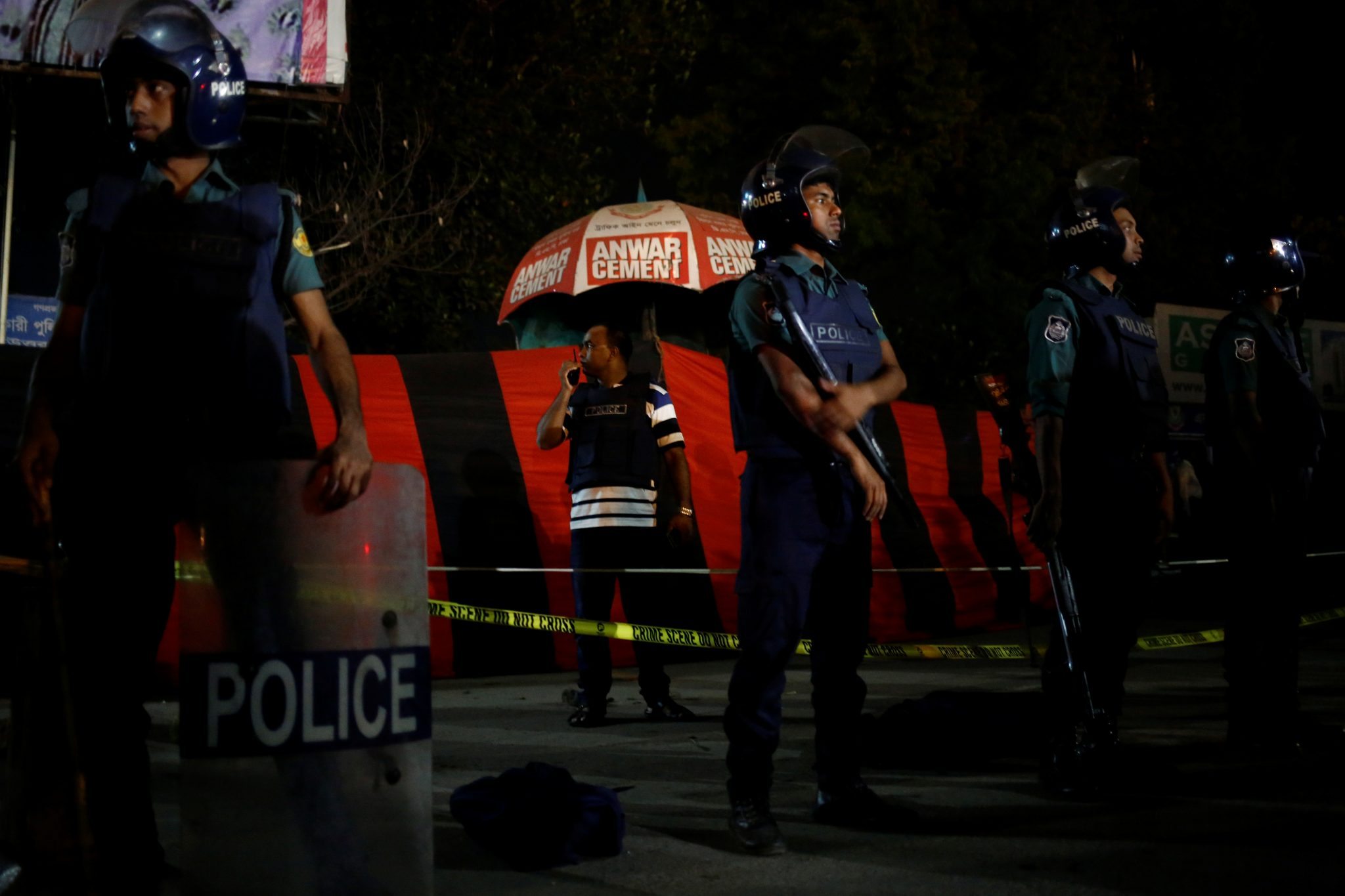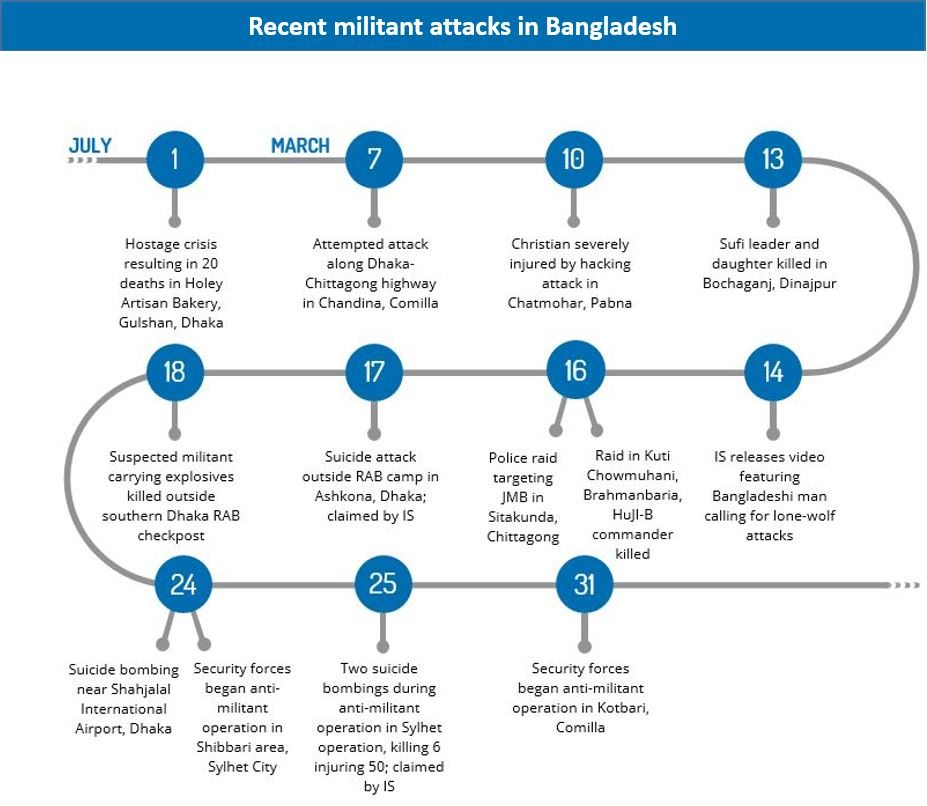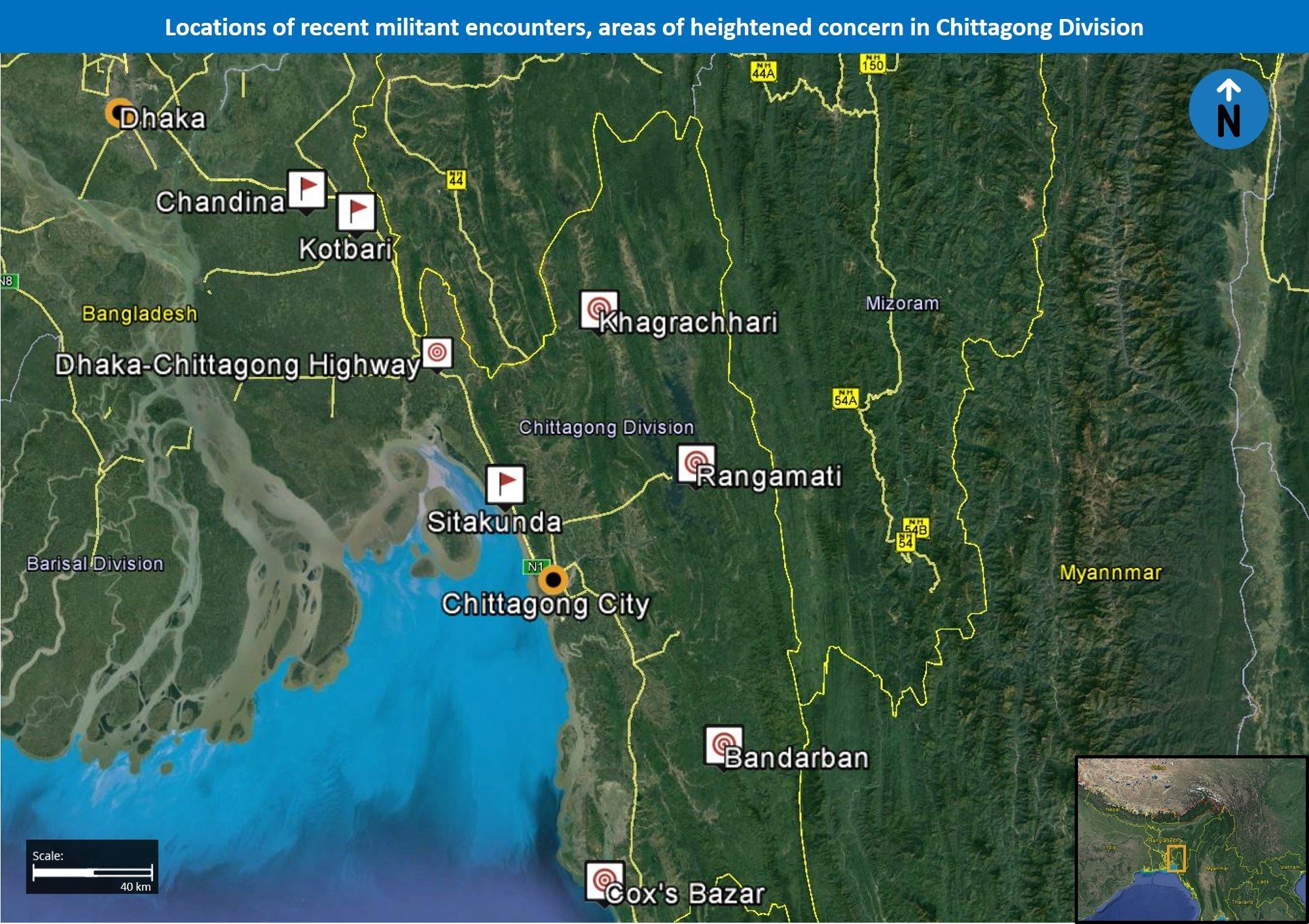Current Situation: Bangladesh Islamist militants
The Islamic State (IS) affiliate al-Furat Media released a video on March 14 featuring a Bangladeshi man who identified himself with his Islamic name, Abu Maruam al-Bengali. In the video, al-Bengali calls upon his Muslim countrymen to carry out domestic lone-wolf attacks throughout the South Asian country. Meanwhile, there have been reported a series of attacks by Bangladesh Islamist militants linked to groups such as the Neo Jamaatul Mujahideen Bangladesh (Neo-JMB) in the month of March. Additionally, several encounters between security forces and members of these groups have been reported during nationwide operations to dismantle their cells, particularly in the peripheral border divisions of the country.
Background
On July 1, there was a hostage crisis and multiple murders at the Holey Artisan Bakery in Gulshan, Dhaka. IS claimed this attack that left 22 civilians dead, many of whom were foreign workers in the country’s garment industry. Following the attack, Bangladeshi security forces began an increased concerted effort to combat militancy. The government continued to deny any direct IS presence in Bangladesh, instead blaming “homegrown outfits”, and Jamaat-ul-Mujahideen (JMB) and the Neo-JMB, domestic militant groups. Such operations continued at a consistent pace, with March alone witnessing the arrest of at least 50 suspected militants
Assessments & Forecast
Direct IS operational presence continues to remain questionable but fresh wave of attacks indicates the group is capable of rallying domestic groups to carry out its strategic agendas
The raids on Islamist militant cells and training facilities in areas like Chittagong and Sylhet Divisions indicate that these groups appear to have been in the process of upgrading their operational capabilities in terms of explosives. This has been evident in the recoveries of explosives material such as hydrogen peroxide and acid, typically used to make the more volatile IEDs involving triacetone triperoxide (TATP). Additionally, the cells functioning as production units for these explosives appear to have developed covert distribution channels to funnel them to militants across their division as well as those in Dhaka Division.
In response to these attempts to upgrade operations and stage more attacks, IS is likely to increase its recognition of local cells’ efforts in the form of claims and the reporting of these incidents through their media, similar to what was witnessed in the aftermath of attacks in Dhaka on March 17 and 24, and Sylhet on March 25. Further, the release of the video, specifically calling for lone-wolf attacks, suggests that IS has not yet developed a consolidated, formal presence on the ground, as the need to call for such attacks suggests that they are unable to set up more elaborate networks. Therefore, while IS may not have an established a physical presence in Bangladesh, its high command appears closely aware of Islamist militant incidents in the country, as a part of its pivot to new territories outside the Middle East. Additionally, IS will likely continue to rally domestic militants to carry out its strategic agendas through the validation it provides in its media for these operatives’ local attacks.
Given the publicizing of the two most recent operations, overlapping in their occurrence, the frequency of counter-militancy raids is likely to visibly increase in the coming weeks, both to stymie the new wave of attacks and as a means to project a proactive, offensive posture. While such raids may take place in peripheral areas across the country, a number of areas are of particular concern. Northern, outlying regions of the country remain under elevated threat of attack and counter-militancy operations, given the presence of minority groups and a perceived high adherence to conservative Islam within local communities. The threat is especially pronounced in places of recent incidents like Sylhet, as well as areas where a number of attacks took place during previous waves of violence like Rajshahi, and Rangpur.
Further, in light of the hideouts in Chittagong, which were the most fortified and well-equipped dens uncovered in the recent past, it remains likely that JMB and other militant groups have developed a number of sophisticated hubs in the region, whose hilly geography would provide ample cover for planning activities. As such, additional operations in Chittagong are likely to take place in nearby areas where other similar groups may be planning activities, including Cox’s Bazar, Rangamati, Bandarban, and Khagrachhari.
Government’s continued denial of IS presence in Bangladesh likely an attempt to assure foreign investors, allow for broad crackdowns on domestic groups
Despite increasing evidence that IS maintains some degree of involvement in Bangladesh, the government is likely concerned that admitting it would have a negative impact on the country’s economy, especially on the garment industry, which accounts for a staggering 80 percent of total exports. These concerns were similar following the Gulshan attack when a number of multinational garment companies operating in Bangladesh voiced their concerns over the volatile security out of Bangladesh entirely. By posing the issue as a homegrown, domestic issue, it denotes a lower level threat compared to that of transnational militancy.
Additionally, the presence of Neo-JMB and even non-militant Islamist groups like Jamaat-e-Islami (JeI) serves as an adequate enough pretext to crackdown on any suspected Islamists, regardless of their actual affiliation. Security operations in March highlight this focus, with the majority of the militants, arrested reportedly members of Neo-JMB. This serves to the benefit of the current administration, as such groups are largely comprised of former opposition activists, vehemently against the Awami League-led government. While the labeling of such groups is relatively semantic, under the current narrative the government can place the blame squarely on domestic militant groups it often conflates with mainstream political organizations. While the majority were from JMB, at least 2,100 were reportedly leaders and activists from the Bangladesh Nationalist Party (BNP), the Awami League’s main political opposition.
While in the short-term playing down transnational militancy may serve to appease foreign investors and improve the political standing of the current administration, in the long-run, it may also have unintended consequences, particularly as the links between IS and domestic groups become increasingly more difficult to deny. Firstly, the denial may serve to corrode the government’s credibility in defining the current narrative. As international media outlets and independent analysis increasingly highlight alleged links between transnational groups and domestic Bangladeshi militants, even supporters of the Awami League may begin to doubt the plausibility of the government’s stance.
Further, Bangladeshi society has a multitude of Islamist camps, which maintain varying degrees of sympathy for the groups that are often targeted by the government during crackdowns. Perceptions of unmerited mass arrests against such organizations would likely serve to alienate conservative and even moderate Muslims that maintain pro-Islamist sentiments. Ultimately, this would serve to improve militant recruitment in the country and encourage additional lone-wolf style attacks, further actualizing the Islamic State’s original March 14 call.
Recommendations
Travel to Dhaka and Chittagong may continue at this time while adhering to stringent security protocols given the threat of militancy, crime, and reports of violence from political rivalries. Those operating or residing throughout northern and southern areas of Bangladesh are advised to maintain heightened vigilance, especially in the aforementioned areas of Chittagong, Rajshahi, Rangpur, Sylhet, and Chittagong , given the elevated threat of both sophisticated and unsophisticated attacks, as well as an uptick in counter-militancy raids, which often result in civilian casualties. Given the continued threat of militant attacks against foreign nationals and interests in Bangladesh, foreign nationals, and especially Westerns, are advised to maintain a low profile, avoid travel if possible at night, review security procedures, and maintain heightened vigilance throughout the country.


